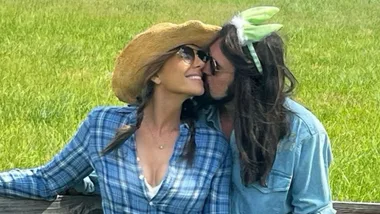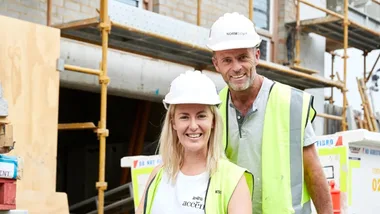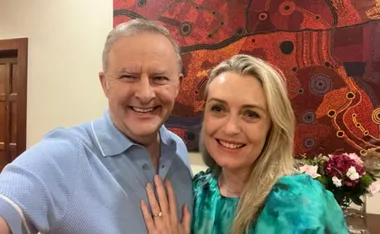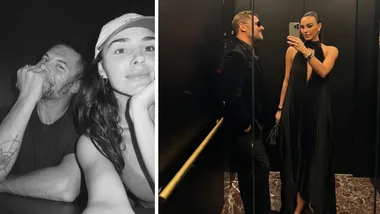On the surface, Georgie Gardner appears to have a perfect life. She has a loving husband, two healthy children and a fulfilling career as a news reader on Channel Nine’s Today — but underneath the flawless facade lurks a traumatic childhood that has made her what she is today.
Georgie was one of four children born and bred in Perth. Her early childhood was happy but when she was five years old, her parents went through a bitter divorce.
Her mother remarried shortly afterwards and Georgie’s world turned upside down.
Related: Rebecca Gibney – Why I’ll never diet again
Her new post-divorce life had all the trappings of domestic bliss. She lived in Dalkeith, one of Perth’s most affluent suburbs. She attended St Hilda’s, the Western Australian capital’s most exclusive private girl’s school.
Her mother was a pillar of Perth society and her new stepfather was the son of the state’s governor and a well-known lawyer.
There were trips to Government House when the queen was visiting, tea parties and pretty frocks. From the outside, theirs was a life of privilege and respectability, but beyond the white picket fence and behind closed doors, life was infinitely more complicated.
“There was a tumultuous divorce when we were very young and it led to difficulties in the house we were growing up in with our mother and stepfather, and it was not pleasant,” explains Georgie’s younger brother, John.
“I don’t have particularly fond memories of childhood myself and I know Georgie doesn’t.”
Suzanne Julian is one of Georgie’s oldest friends. They met at school when they were 12 years old. Suzanne remembers Georgie as a “natural leader” with “the gift of the gab and a wicked sense of humour” who had lead roles in all the school musicals such that “everyone assumed she was going to leave school and become an actress”.
Suzanne also spent a lot of time at Georgie’s house and saw first-hand the tensions with which Georgie and her siblings lived. “I was very aware of what was playing out in her home life,” recalls Suzanne.
“Everything was not as it seemed on the outside. There was a lot of pressure on Georgie as a young girl — there were things going on at home that were not pleasant. You can go to the best school and wear a nice uniform, but if things are not right at home, you are no better off than anyone else.
“Georgie has definitely been affected by her family situation over the years. Knowing all the crap she has been through, the way she has blossomed is such a credit to her. Instead of dwelling on it, she has carved out such an amazing, impressive life.”
When asked, Georgie herself won’t be drawn on exactly what the home life “unpleasantness” comprised, except to say she and her siblings suffered after their mother remarried.
“We had a privileged upbringing, in the material and opportunity sense, but there was a lot of turbulence and confusion, and deep sadness brought on by a pretty bitter divorce,” she says. “During the darkest period, my friends and siblings got me through.”
Though she won’t say it outright, it’s obvious that Georgie experienced some sort of trauma growing up. She says she doesn’t want to talk about it publicly — “It risks hurting too many people I care about” — yet it clearly gives shape to her every day.
She has only limited contact with her mother now and mainly for the sake of not denying her children a relationship with their grandmother.
And yet she’s also acutely aware of the privileges she enjoyed and the opportunities afforded by her education and upbringing. She bristles visibly at any suggestion she is a victim.
“I never feel, ‘Woe is me’, because I have so much in my life now to be grateful for and I have managed to extricate myself from that toxic environment and surround myself with beautiful, loving, incredible people,” she says.
Related: Do children really make us happy?
“Suffice to say, divorce can be very destructive and a fair amount of pain and misunderstanding exists to this day. But I try and focus on the positives and, without question, my greatest achievement is creating the family unit I have now. They’re my world. I’m at my happiest when I’m with my family.”
Read more of this story in the April issue of The Australian Women’s Weekly.

Video: Georgie Gardner investigates youth homelessness











